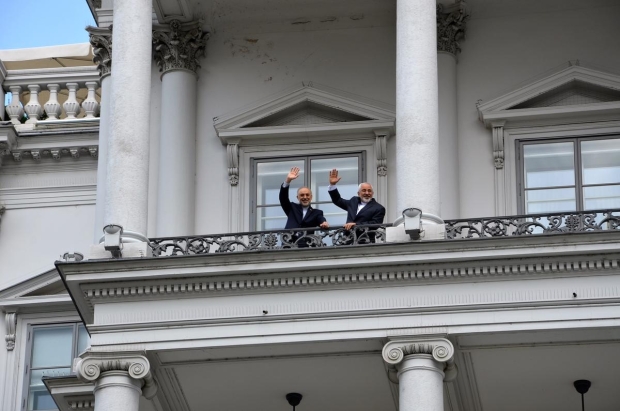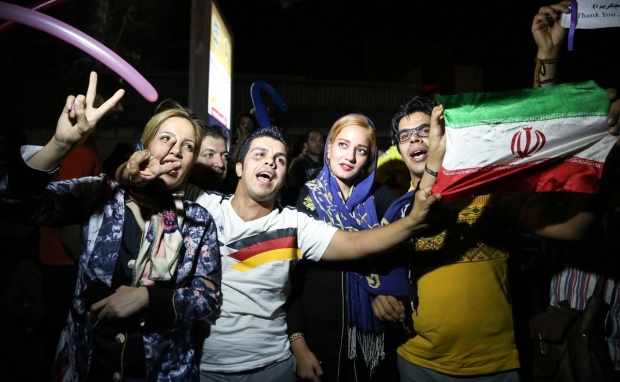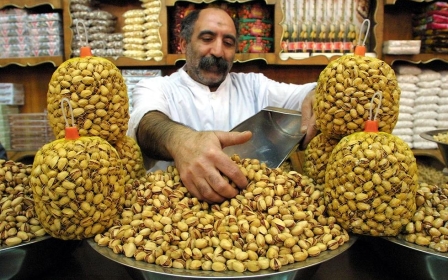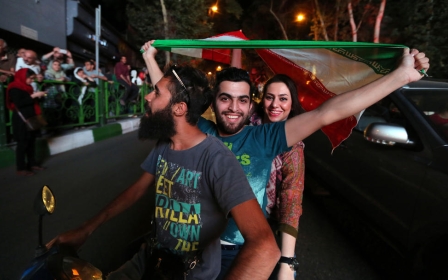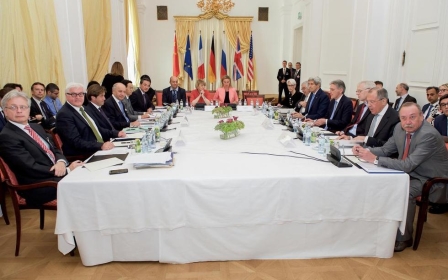Hero's welcome for nuclear negotiator on Tehran return
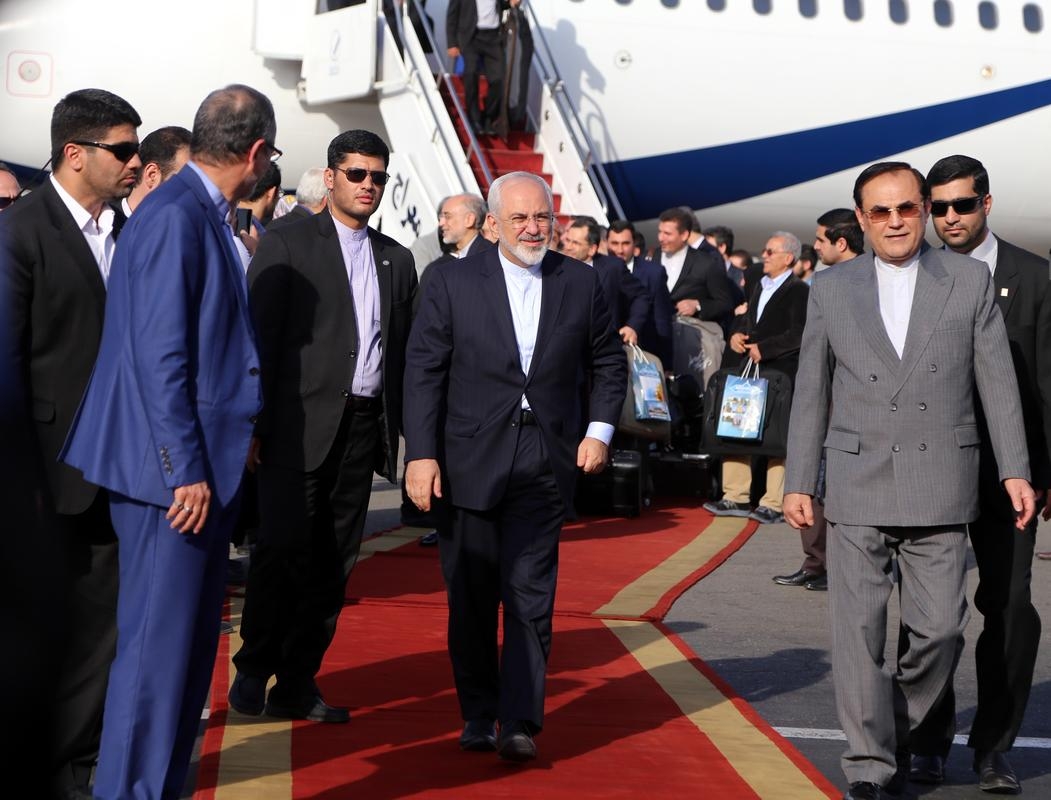
TEHRAN - After sealing his country’s historic nuclear agreement with the United States and other world powers in Vienna, Iranian Foreign Minister Mohammad Javad Zarif gave journalists from his homeland a special opportunity to quiz him about the deal by inviting them to join him aboard his plane for the return flight to Tehran.
With about 32 reporters joining officials from the foreign ministry, the mood aboard the plane was jubilant, both at the eagerly awaited conclusion of the long negotiations and over reports of celebrations on the streets back home.
After takeoff, Zarif said he had some surprises in store for his fellow travellers, including a detour via Mashhad, the city considered Iran’s spiritual capital as site of the holy shrine of the eighth Shiite Imam.
“I had promised our diplomats we would go to the Imam Reza shrine if we reached a deal. Imam Reza is the pride of Iran and the source of everything we have,” Zarif told the journalists.
Selfies amid the fatigue
Despite his obvious fatigue, Zarif joined reporters a few times during the flight, allowing them to take selfies with him and answering their informal questions regarding the nuclear talks and his famous “balcony diplomacy” - a reference to his appearance after the negotiation sessions on the balcony of Vienna’s Palais Coburg hotel, where he would answer questions shouted from reporters gathered below.
Responding to one question about the exact time the nuclear deal was agreed, Zarif said: “It was about 11pm local time on Monday that we reached a general agreement, then the deputies [of foreign ministers] continued the task of finishing the text of the deal. I guess [Abbas] Araghchi [Iran’s chief negotiator] and [Deputy Foreign Minister Majid Takht-] Ravanchi’s work went on until 3:30am on Tuesday.”
‘No deadline’
Zarif also spoke about the deadline that might have been faced had the agreement not been reached on Monday night.
“From day one, we said that we have no deadline, and if talks had been extended, I would have stayed; but you should have been there to see what [Russian Foreign Minister Sergey] Lavrov and [French Foreign Minister Laurent] Fabius did to finish the issue on the Monday night.”
Asked about Lavrov’s noted absence from the ceremony marking the agreement, Zarif simply replied: “Lavrov had to go to Uzbekistan.”
According to Russian journalists, Lavrov briefed them prior to the ceremony on what was going on at the diplomats’ meetings, the future of Iranian-Russian relations, and the issue of Russia’s previously proposed delivery of its S300 missile defence system to Iran, which was halted due to UN sanctions.
Zarif’s other surprise was a gift of $100 to each reporter to mark Eid al-Fitr, the holiday at the end of the Ramadan fasting month.
Also on the plane to Tehran and sharing time with reporters were the head of Iran’s Atomic Energy Organization, Ali Akbar Salehi, and Hossein Fereydoun, special aide to the president. Both were on the nuclear deal negotiating team.
In the relaxed mood of the return flight, Fereydoun told the reporters jokingly: “Every time I saw you journalists from the balcony, my heart went out to you [waiting for the next news to report].”
Triumphant welcome at shrine
A triumphant welcome awaited Zarif and the other negotiators when they arrived at Mashhad at 5am local time (00:30 GMT) after a five-hour flight, with local people chanting “Dr Mochakerim!” (“Dr Zarif, thank you!”), and cars with pictures of Zarif hanging out of car windows following the foreign minister’s bus to the shrine.
Zarif responded by placing his right hand over his chest to show his respect for the people.
At the shrine, Zarif, wearing the trench coat that marks out the volunteers who direct and help the pilgrims to get around the holy site, was again surrounded by well-wishers.
After a two-hour stopover, the party flew on to Tehran, where Zarif was welcomed by Mahmoud Vaezi and Hassan Qazizadeh Hashemi, the technology and health ministers respectively, along with the families of Iranian nuclear scientists killed in apparent car bombings, which Iran claims were targeted assassinations, over the years leading up to the international agreement.
Zarif and Araghchi appeared close to tears as the families of the slain scientists praised and thanked the nuclear team.
By the time of Zarif’s arrival, Tehran and other cities had already experienced a night of jubilation as people celebrated the prospect of an end to the sanctions that for years had hurt their country’s economy.
The capital city’s residents took to their cars, honking horns and chanting “Rouhani Mochakerim!” (“Rouhani, thank you!”), and making victory signs.
The number of people on the streets was comparable with two other events over the past two years: Hassan Rouhani’s victory in the 2013 presidential election and Iran’s World Cup football match against Argentina last year (when Iran lost to a single late goal).
Iranian flags and pictures of Rouhani and Zarif bedecked the streets, and happy crowds chanted and waved banners. Young people, asked why they had taken to the streets and were dancing on top of their cars, responded with one word: “Victory!”
National hero
Zarif, for many Iranians, is now a national hero who ranks alongside Amir Kabir, an innovative chief minister in the mid-19th century, and Mohammad Mosadegh, the democratically elected prime minister ousted in a coup with the help of Western powers in 1953.
The two have always been a source of pride for Iranians; the first tried to modernise Iran, while the latter nationalised Iran’s oil industry.
The joyous atmosphere even prompted some jokes on the prospect of a warmer relationship between the long-hostile Iran and the United States. In one, a man says, “I hope our relationship with the US doesn’t get intimate, because I’m shy to call President Obama uncle.”
One man in party mood, Ali Ghayumi, told Middle East Eye: “I’m pleased to see the 12-year fabricated crisis which had caused setbacks for this country over. We want the world to portray Iran and Iranians correctly as a peace-loving nation. We should be able to achieve what this people deserve in scientific, economic and healthcare areas through communication with the world.”
The nuclear deal also raises hopes for an end to black markets, stabilisation of the country’s currency, a decline in corruption and a booming economy. But if high expectations are not managed by the government, they could become problematic.
Rasoul Sadeghi, a doctoral candidate of political science at Tehran’s Islamic Azad University, told MEE: “The nuclear deal will change the direction of Iran in the world and will increase the credit and prestige of the country on the global stage."
“It can be predicted that by this deal, our relationships with the world and with our neighbours, even with Saudi Arabia, will improve," he added. "Saudis who tried to kill the deal will now attempt to get close to Tehran.”
The nuclear deal will play an important role in the elections for the Assembly of Experts (the body tasked with electing a new Supreme Leader) and for parliament, with both due to be held next February.
Hardliners, who were waiting to hear the news of failure in the nuclear talks, are now searching the text of the deal to find any error.
However, many analysts say that Zarif’s achievement goes beyond the “red lines” that would have been the minimum terms necessary for Iran to agree a deal.
Rouhani had put all of his energy and political capital into the negotiations, and failure could have meant the end of his career. Now he - and Zarif - can relax a little before considering the future.
New MEE newsletter: Jerusalem Dispatch
Sign up to get the latest insights and analysis on Israel-Palestine, alongside Turkey Unpacked and other MEE newsletters
Middle East Eye delivers independent and unrivalled coverage and analysis of the Middle East, North Africa and beyond. To learn more about republishing this content and the associated fees, please fill out this form. More about MEE can be found here.


